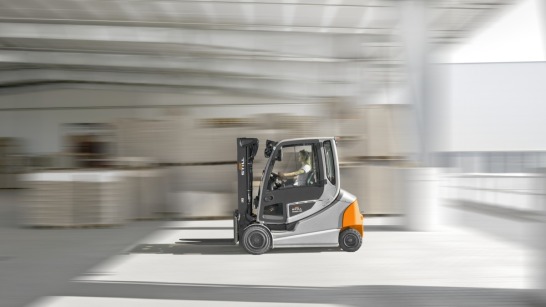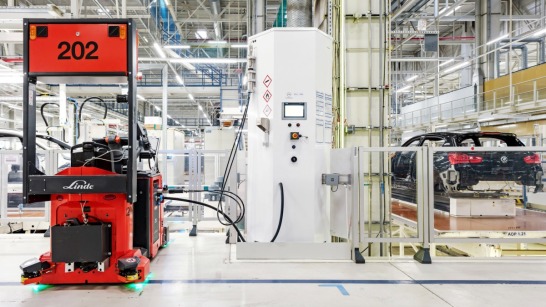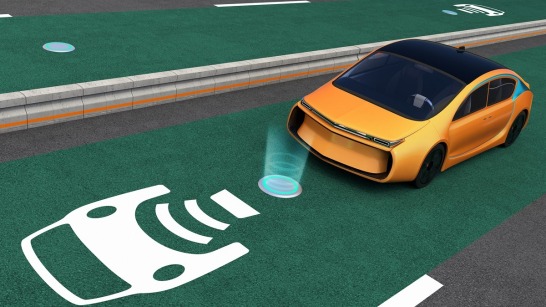When you consider the many benefits of lithium-ion technology, such as high energy efficiency, time-efficient intermediate charging, zero-emission operation and user-friendly processes, it becomes clear why the technology has been a key development area within KION Group for some time. Its various brands are well-known pioneers in electric forklift trucks and warehouse trucks. Energy-efficient lithium-ion batteries are available across the fleet at Linde Material Handling and STILL and the demand is growing. “Our customers are looking for future-proof energy solutions that place equal emphasis on the environment and the bottom line,” explains Carsten Harnisch, vice president of New Energy Systems at KION, adding, “We are working flat out to drive the technology and related business models forward.”
The right size for every need
The enthusiasm for the subject is obvious throughout the project team. “Lithium-ion technology is a real game-changer,” notes Heiko Sippel, head of Energy Storage & Chargers in CTO Module Development, KION’s groupwide development department. “Their power density is at least 30 percent higher than lead-acid batteries, which gives us much higher energy levels in the same amount of space.” It can be quite instructive to directly compare lead-acid batteries with the comprehensive portfolio of lithium-ion batteries available from KION brand Linde Material Handling. Customers considering the switch to lithium-ion technology can select a battery that is half, double or the same size as the equivalent lead-acid unit. Their choice will determine the advantages they can enjoy. Smaller batteries are suitable where short charging intervals between full charges can easily be integrated into the process, including a few minutes where the cells of the rapid-charging batteries can recharge as required. Larger batteries are an ideal option where deployment over three shifts without a break is the norm.
Greater efficiency, greater profitability
No matter what a customer selects from Linde MH’s or STILL’s extensive portfolio of lithium-ion batteries, each one has an efficiency level of around 95 percent. Thus, almost the entire energy supplied during charging is available for use. Customers will notice this every day because the trucks simply run longer. And they will benefit from the batteries’ longer lifespan. “We already cover the entire lifetime of a forklift truck with a lithium-ion battery,” says Sippel. Replacement batteries are a thing of the past as is the time required for maintenance and replacement. Another benefit is that the ventilated charging areas associated with lead-acid technology are no longer needed since no gases or acids are released during the charging of lithium-ion batteries. All these factors mean that the total cost of ownership for lithium-ion technology is significantly lower than for lead-acid batteries. “We have done the calculations for hundreds of specific uses and have come to the conclusion that whenever a battery swap is involved, a lithium-ion battery is the more cost-effective option,” states Christoph Englert, product manager for Energy Solutions at Linde MH. He estimates that the investment cost is recouped within four years, if not sooner.
“Lithium-ion technology offers peace of mind by solving a customer problem immediately and for the long term. What our customers really want is to transport items from ‘A’ to ‘B’ without a hitch. Energy and maintenance are not high on their agenda,” says Björn Grünke, product manager for Energy Systems at STILL. That is why lithium-ion batteries have been a firm fixture in the company’s product portfolio – just as at Linde MH – since 2014. At Dematic, KION Group’s automation specialist, the batteries are an integral element of many products, especially in driverless transport systems. “Lithium-ion batteries are also an interesting and attractive drive variant for mobile automation,” says Tobias Zierhut, senior vice president of Mobile Automation at KION Group. The technology offers two significant benefits for the networked systems in automated guided vehicles (AGVs): a high power density, which allows for deployment over several shifts, and flexible charging options. “Traffic management directs the trucks to the nearest charging station whenever it is convenient from an operational perspective, no matter how much energy is left in the battery,” Zierhut explains. Lithium-ion batteries have a much longer lifespan than their lead-acid predecessors, a significant advantage in cold store intralogistics, where automated transport systems are increasingly common.


